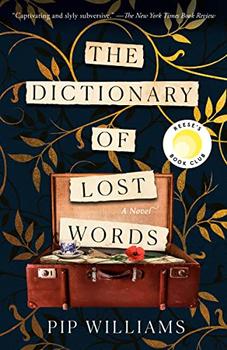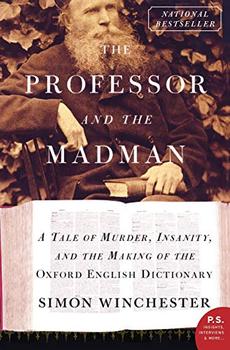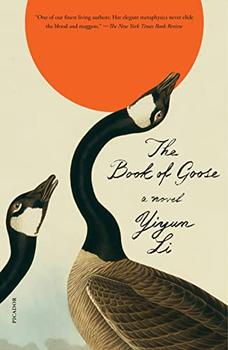Summary | Excerpt | Reading Guide | Reviews | Beyond the book | Read-Alikes | Genres & Themes | Author Bio

In this remarkable debut based on actual events, as a team of male scholars compiles the first Oxford English Dictionary, the daughter of one of them decides to collect the "objectionable" words they omit.
Esme is born into a world of words. Motherless and irrepressibly curious, she spends her childhood in the Scriptorium, a garden shed in Oxford where her father and a team of dedicated lexicographers are collecting words for the very first Oxford English Dictionary. Young Esme's place is beneath the sorting table, unseen and unheard. One day a slip of paper containing the word bondmaid flutters beneath the table. She rescues the slip, and when she learns that the word means "slave girl," she begins to collect other words that have been discarded or neglected by the dictionary men.
As she grows up, Esme realizes that words and meanings relating to women's and common folks' experiences often go unrecorded. And so she begins in earnest to search out words for her own dictionary: the Dictionary of Lost Words. To do so she must leave the sheltered world of the university and venture out to meet the people whose words will fill those pages.
Set during the height of the women's suffrage movement and with the Great War looming, The Dictionary of Lost Words reveals a lost narrative, hidden between the lines of a history written by men. Inspired by actual events, author Pip Williams has delved into the archives of the Oxford English Dictionary to tell this highly original story. The Dictionary of Lost Words is a delightful, lyrical, and deeply thought-provoking celebration of words and the power of language to shape the world.
The main action spans the 40 years of the original composition of the OED. That scope means that there is a lot of skipping forward in time, with subsequent chapters often set a year or a few years into the future. While Williams effectively presents the sweep of Esme's life, I wished I could spend more time with this character on ordinary days. Along with the history of the dictionary, I most appreciated the relationships Esme has with the various women in her life. Women's bonds and women's words are strong themes in this forthrightly feminist novel that, despite its flaws, would make a great book club selection...continued
Full Review
 (745 words)
(745 words)
(Reviewed by Rebecca Foster).
Pip Williams was prompted to write The Dictionary of Lost Words, a novel including historical detail about words omitted from the Oxford English Dictionary, by reading Simon Winchester's 1998 book The Professor and the Madman and wondering where women were in the story of the dictionary. Below is some background on Winchester's book as well as some additional works about dictionaries and words that have been lost from their pages — or just fallen out of regular usage.
 The Professor and the Madman focuses on a niche, though fascinating, incident. For two decades, Professor James Murray, editor of the OED, corresponded with Dr. William Chester Minor, one of thousands of volunteers who sent in quotations for the dictionary's ...
The Professor and the Madman focuses on a niche, though fascinating, incident. For two decades, Professor James Murray, editor of the OED, corresponded with Dr. William Chester Minor, one of thousands of volunteers who sent in quotations for the dictionary's ...

If you liked The Dictionary of Lost Words, try these:

by Anne Curzan
Published 2025
A kinder, funner usage guide to the ever-changing English language and a useful tool for both the grammar stickler and the more colloquial user of English, from linguist and veteran professor Anne Curzan

by Yiyun Li
Published 2023
A magnificent, beguiling tale winding from the postwar rural provinces to Paris, from an English boarding school, to the quiet Pennsylvania home where a woman can live without her past, The Book of Goose is a story of disturbing intimacy and obsession, of exploitation and strength of will, by the celebrated author Yiyun Li.
Censorship, like charity, should begin at home: but unlike charity, it should end there.
Click Here to find out who said this, as well as discovering other famous literary quotes!